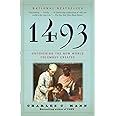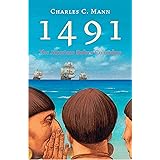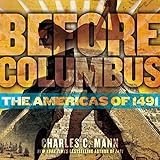Buy new:
-46% $10.80$10.80
Save with Used - Good
$9.59$9.59
Ships from: Amazon Sold by: Martistore

Download the free Kindle app and start reading Kindle books instantly on your smartphone, tablet, or computer - no Kindle device required.
Read instantly on your browser with Kindle for Web.
Using your mobile phone camera - scan the code below and download the Kindle app.

OK
 Audible sample Sample
Audible sample Sample 


1493: Uncovering the New World Columbus Created Paperback – July 24, 2012
Purchase options and add-ons
Presenting the latest research by biologists, anthropologists, archaeologists, and historians, Mann shows how the post-Columbian network of ecological and economic exchange fostered the rise of Europe, devastated imperial China, convulsed Africa, and for two centuries made Mexico City—where Asia, Europe, and the new frontier of the Americas dynamically interacted—the center of the world. In this history, Mann uncovers the germ of today's fiercest political disputes, from immigration to trade policy to culture wars. In 1493, Mann has again given readers an eye-opening scientific interpretation of our past, unequaled in its authority and fascination.
- Print length720 pages
- LanguageEnglish
- PublisherVintage
- Publication dateJuly 24, 2012
- Dimensions5.15 x 1.39 x 7.92 inches
- ISBN-109780307278241
- ISBN-13978-0307278241
Books with Buzz
Discover the latest buzz-worthy books, from mysteries and romance to humor and nonfiction. Explore more
Frequently bought together

Similar items that may deliver to you quickly
 To ecologists, the Columbian Exchange is arguably the most important event since the death of the dinosaurs.Highlighted by 1,388 Kindle readers
To ecologists, the Columbian Exchange is arguably the most important event since the death of the dinosaurs.Highlighted by 1,388 Kindle readers Colón’s signal accomplishment was, in the phrase of historian Alfred W. Crosby, to reknit the seams of Pangaea.Highlighted by 1,077 Kindle readers
Colón’s signal accomplishment was, in the phrase of historian Alfred W. Crosby, to reknit the seams of Pangaea.Highlighted by 1,077 Kindle readers England shipped more than seven thousand people to Virginia between 1607 and 1624. Eight out of ten died.Highlighted by 958 Kindle readers
England shipped more than seven thousand people to Virginia between 1607 and 1624. Eight out of ten died.Highlighted by 958 Kindle readers
Editorial Reviews
Review
"Fascinating ... Lively ... A convincing explanation of why our world is the way it is."
—The New York Times Book Review
"Even the wisest readers will find many surprises here.... Like 1491, Mann's sequel will change worldviews."
—San Francisco Chronicle
"Exemplary in its union of meaningful fact with good storytelling, 1493 ranges across continents and centuries to explain how the world we inhabit came to be."
—The Washington Post
“Engaging ... Mann deftly illuminates contradictions on a human scale: the blind violence and terror at Jamestown, the cruel exploitation of labor in the silver mines of Bolivia, the awe felt by Europeans upon first seeing a rubber ball bounce.”
—The New Yorker
“Revelatory.”
—Lev Grossman, Time Magazine
“Compelling and eye-opening.”
—Publishers Weekly Top 100 Books of 2011
“A book to celebrate.... A bracingly persuasive counternarrative to the prevailing mythology about the historical significance of the ‘discovery’ of America ... 1493 is rich in detail, analytically expansive and impossible to summarize ... [Mann’s book] deserves a prominent place among that very rare class of books that can make a difference in how we see the world, although it is neither a polemic nor a work of advocacy. Thoughtful, learned and respectful of its subject matter, 1493 is a splendid achievement.”
—The Oregonian
“Despite his scope, Mann remains grounded in fascinating details.... Such technical insights enhance a very human story, told in lively and accessible prose.”
—Cleveland Plain-Dealer
“Mann’s excitement never flags as he tells his breathtaking story ... There is grandeur in this view of the past that looks afresh at the different parts of the world and the parts each played in shaping it.”
—Financial Times
“A muscular, densely documented follow-up [to Mann’s 1491] ... Like its predecessor, 1493 runs to more than 400 pages, but it moves at a gallop ... As a historian Mann should be admired not just for his broad scope and restless intelligence but for his biological sensitivity. At every point of his tale he keeps foremost in his mind the effect of humans’ activities on the broader environment they inhabit.”
—The Wall Street Journal
“Evenhandedness, a sense of wonder, the gift of turning a phrase ... Mann loves the world and adopts it as his own.”
—Science
“Charles C. Mann glories in reality, immersing his reader in complexity.... The worn clichés crumble as readers gain introductions to the freshest of the systems of analysis gendered in the first post-Columbian millennium.”
—Alfred W. Crosby, author of The Columbian Exchange
“In the wake of his groundbreaking book 1491 Charles Mann has once again produced a brilliant and riveting work that will forever change the way we see the world. Mann shows how the ecological collision of Europe and the Americas transformed virtually every aspect of human history. Beautifully written, and packed with startling research, 1493 is a monumental achievement."
—David Grann, author of The Lost City of Z
“[1493] is readable and well-written, based on his usual broad research, travels and interviews. A fascinating and important topic, admirably told.”
—John Hemming, author of Tree of Rivers
“Fascinating ... Convincing ... A spellbinding account of how an unplanned collision of unfamiliar animals, vegetables, minerals and diseases produced unforeseen wealth, misery, social upheaval and the modern world.”
—Kirkus Reviews, starred review
“A fascinating survey ... A lucid historical panorama that’s studded with entertaining studies of Chinese pirate fleets, courtly tobacco rituals, and the bloody feud between Jamestown colonists and the Indians who fed and fought them, to name a few. Brilliantly assembling colorful details into big-picture insights, Mann’s fresh challenge to Eurocentric histories puts interdependence at the origin of modernity.”
—Publishers Weekly (starred review)
“Charles Mann expertly shows how the complex, interconnected ecological and economic consequences of the European discovery of the Americas shaped many unexpected aspects of the modern world. This is an example of the best kind of history book: one that changes the way you look at the world, even as it informs and entertains.”
—Tom Standage, author of A History of the World in Six Glasses
“A landmark book.... Entrancingly provocative, 1493 bristles with illuminations, insights and surprises.”
—Shelf Awareness
“Fascinating ... Engaging and well-written ... Information and insight abound on every page. This dazzling display of erudition, theory and insight will help readers to view history in a fresh way.”
—BookPage
“Spirited ... One thing is indisputable: Mann is definitely global in his outlook and tribal in his thinking ... Mann’s taxonomy of the ecological, political, religious, economic, anthropological and mystical melds together in an intriguing whole cloth.”
—The Star-Ledger
“Mann has managed the difficult trick of telling a complicated story in engaging and clear prose while refusing to reduce its ambiguities to slogans. He is not a professional historian, but most professionals could learn a lot from the deft way he does this.... 1493 is thoroughly researched and up-to-date, combining scholarship from fields as varied as world history, immunology, and economics, but Mann wears his learning lightly. He serves up one arresting detail after another, always in vivid language. Most impressive of all, he manages to turn plants, germs, insects and excrement into the lead actors in his drama while still parading before us an unforgettable cast of human characters. He makes even the most unpromising-sounding subjects fascinating. I, for one, will never look at a piece of rubber in quite the same way now.... The Columbian Exchange has shaped everything about the modern world. It brought us the plants we tend in our gardens and the pests that eat them. And as it accelerates in the 21st century, it may take both away again. If you want to understand why, read 1493.”
—The New York Times Book Review
“Mann is trying to do much more than punch holes in conventional wisdom; he’s trying to piece together an elaborate, alternative history that describes profound changes in the world since the original voyage of Columbus. What's most surprising is that he manages to do this in such an engaging way. He writes with an incredibly dry wit.”
—Austin American-Statesman
“Mann’s book is jammed with facts and factoids, trivia and moments of great insight that take on power as they accumulate.”
—The Washington Post
“Although many have written about the impact of Europeans on the New World, few have told the worldwide story in a manner accessible to lay readers as effectively as Mann does here.”
—Library Journal
“The chief strength of Mann’s richly associative books lies in their ability to reveal new patterns among seemingly disparate pieces of accepted knowledge. They’re stuffed with forehead-slapping ‘aha’ moments.... If Mann were to work his way methodically through the odd-numbered years of history, he could be expected to publish a book about the global impact of the Great Recession sometime in the middle of the next millennium. If it’s as good as 1493, it would be worth the wait.”
—Richmond Times-Dispatch
“None of us could travel with Columbus in 1492. But that’s OK, because in 1493 we can take an even more exhilarating ride. This powerful rethinking of the origins and consequences of globalization is so illuminating, it’s scary.”
—Carl Safina, author of A Sea In Flames and The View From Lazy Point
“Almost mind-boggling in its scope, enthusiasm and erudition.... Almost every page of 1493 contains some extraordinarily provocative argument or arrestingly bizarre detail.... Ranging freely across time and space, Mann’s book is full of compelling stories.... A tremendously provocative, learned and surprising read.”
—The Times of London
About the Author
Excerpt. © Reprinted by permission. All rights reserved.
The Seams of Panagaea
Although it had just finished raining, the air was hot and close. Nobody else was in sight; the only sound other than those from insects and gulls was the staticky low crashing of Caribbean waves. Around me on the sparsely covered red soil was a scatter of rectangles laid out by lines of stones: the outlines of now- vanished buildings, revealed by archaeologists. Cement pathways, steaming faintly from the rain, ran between them. One of the buildings had more imposing walls than the others. The researchers had covered it with a new roof, the only structure they had chosen to protect from the rain. Standing like a sentry by its entrance was a hand- lettered sign: Casa Almirante, Admiral’s House. It marked the first American residence of Christopher Columbus, Admiral of the Ocean Sea, the man whom generations of schoolchildren have learned to call the discoverer of the New World.
La Isabela, as this community was called, is situated on the north side of the great Caribbean island of Hispaniola, in what is now the Dominican Republic. It was the initial attempt by Europeans to make a permanent base in the Americas. (To be precise, La Isabela marked the beginning of consequential European settlement—Vikings had established a short-lived village in Newfoundland five centuries before.) The admiral laid out his new domain at the confluence of two small, fast- rushing rivers: a fortified center on the north bank, a satellite community of farms on the south bank. For his home, Columbus—Cristóbal Colón, to give him the name he answered to at the time—chose the best location in town: a rocky promontory in the northern settlement, right at the water’s edge. His house was situated perfectly to catch the afternoon light.
Today La Isabela is almost forgotten. Sometimes a similar fate appears to threaten its founder. Colón is by no means absent from history textbooks, of course, but in them he seems ever less admirable and important. He was a cruel, deluded man, today’s critics say, who stumbled upon the Caribbean by luck. An agent of imperialism, he was in every way a calamity for the Americas’ first inhabitants. Yet a different but equally contemporary perspective suggests that we should continue to take notice of the admiral. Of all the members of humankind who have ever walked the earth, he alone inaugurated a new era in the history of life.
The king and queen of Spain, Fernando (Ferdinand) II and Isabel I, backed Colón’s first voyage grudgingly. Transoceanic travel in those days was heart-toppingly expensive and risky—the equivalent, perhaps, of spaceshuttle flights today. Despite relentless pestering, Colón was able to talk the monarchs into supporting his scheme only by threatening to take the project to France. He was riding to the frontier, a friend wrote later, when the queen “sent a court bailiff posthaste” to fetch him back. The story is probably exaggerated. Still, it is clear that the sovereigns’ reservations drove the admiral to whittle down his expedition, if not his ambitions, to a minimum: three small ships (the biggest may have been less than sixty feet long), a combined crew of about ninety. Colón himself had to contribute a quarter of the budget, according to a collaborator, probably by borrowing it from Italian merchants.
Everything changed with his triumphant return in March of 1493, bearing golden ornaments, brilliantly colored parrots, and as many as ten captive Indians. The king and queen, now enthusiastic, dispatched Colón just six months later on a second, vastly larger expedition: seventeen ships, a combined crew of perhaps fifteen hundred, among them a dozen or more priests charged with bringing the faith to these new lands. Because the admiral believed he had found a route to Asia, he was sure that China and Japan— and all their opulent goods—were only a short journey beyond. The goal of this second expedition was to create a permanent bastion for Spain in the heart of Asia, a headquarters for further exploration and trade.
The new colony, predicted one of its founders, “will be widely renowned for its many inhabitants, its elaborate buildings, and its magnificent walls.” Instead La Isabela was a catastrophe, abandoned barely five years after its creation. Over time its structures vanished, their very stones stripped to build other, more successful towns. When a U.S.–Venezuelan archaeological team began excavating the site in the late 1980s, the inhabitants of La Isabela were so few that the scientists were able to move the entire settlement to a nearby hillside. Today it has a couple of roadside fish restaurants, a single, failing hotel, and a little-visited museum. On the edge of town, a church, built in 1994 but already showing signs of age, commemorates the first Catholic Mass celebrated in the Americas. Watching the waves from the admiral’s ruined home, I could easily imagine disappointed tourists thinking that the colony had left nothing meaningful behind— that there was no reason, aside from the pretty beach, for anyone to pay attention to La Isabela. But that would be a mistake.
Babies born on the day the admiral founded La Isabela—January 2, 1494— came into a world in which direct trade and communication between western Europe and East Asia were largely blocked by the Islamic nations between (and their partners in Venice and Genoa), sub- Saharan Africa had little contact with Europe and next to none with South and East Asia, and the Eastern and Western hemispheres were almost entirely ignorant of each other’s very existence. By the time those babies had grandchildren, slaves from Africa mined silver in the Americas for sale to China; Spanish merchants waited impatiently for the latest shipments of Asian silk and porcelain from Mexico; and Dutch sailors traded cowry shells from the Maldive Islands, in the Indian Ocean, for human beings in Angola, on the coast of the Atlantic. Tobacco from the Caribbean ensorcelled the wealthy and powerful in Madrid, Madras, Mecca, and Manila. Group smoke-ins by violent young men in Edo (Tokyo) would soon lead to the formation of two rival gangs, the Bramble Club and the Leather- breeches Club. The shogun jailed seventy of their members, then banned smoking.
Long-distance trade had occurred for more than a thousand years, much of it across the Indian Ocean. China had for centuries sent silk to the Mediterranean by the Silk Road, a route that was lengthy, dangerous, and, for those who survived, hugely profitable. But nothing like this worldwide exchange had existed before, still less sprung up so quickly, or functioned so continuously. No previous trade networks included both of the globe’s two hemispheres; nor had they operated on a scale large enough to disrupt societies on opposite sides of the planet. By founding La Isabela, Colón initiated permanent European occupation in the Americas. And in so doing he began the era of globalization—the single, turbulent exchange of goods and services that today engulfs the entire habitable world.
Newspapers usually describe globalization in purely economic terms, but it is also a biological phenomenon; indeed, from a long-term perspective it may be primarily a biological phenomenon. Two hundred and fifty million years ago the world contained a single landmass known to scientists as Pangaea. Geological forces broke up this vast expanse, splitting Eurasia and the Americas. Over time the two divided halves of Pangaea developed wildly different suites of plants and animals. Before Colón a few venturesome land creatures had crossed the oceans and established themselves on the other side. Most were insects and birds, as one would expect, but the list also includes, surprisingly, a few farm species—bottle gourds, coconuts, sweet potatoes—the subject today of scholarly head-scratching. Otherwise, the world was sliced into separate ecological domains. Colón’s signal accomplishment was, in the phrase of historian Alfred W. Crosby, to reknit the seams of Pangaea. After 1492 the world’s ecosystems collided and mixed as European vessels carried thousands of species to new homes across the oceans. The Columbian Exchange, as Crosby called it, is the reason there are tomatoes in Italy, oranges in the United States, chocolates in Switzerland, and chili peppers in Thailand. To ecologists, the Columbian Exchange is arguably the most important event since the death of the dinosaurs.
Unsurprisingly, this vast biological upheaval had repercussions on human kind. Crosby argued that the Columbian Exchange underlies much of the history we learn in the classroom—it was like an invisible wave, sweeping along kings and queens, peasants and priests, all unknowing. The claim was controversial; indeed, Crosby’s manuscript, rejected by every major academic publisher, ended up being published by such a tiny press that he once joked to me that his book had been distributed “by tossing it on the street, and hoping readers happened on it.” But over the decades since he coined the term, a growing number of researchers have come to believe that the ecological paroxysm set off by Colón’s voyages—as much as the economic convulsion he began—was one of the establishing events of the modern world.
On Christmas Day, 1492, Colón’s first voyage came to an abrupt end when his flagship, the Santa María, ran aground off the northern coast of Hispaniola. Because his two remaining vessels, the Niña and Pinta, were too small to hold the entire crew, he was forced to leave thirty- eight men behind. Colón departed for Spain while those men were building an encampment— a scatter of makeshift huts surrounded by a crude palisade, adjacent to a larger native village. The encampment was called La Navidad (Christmas), after the day of its involuntary creation (its precise location is not known today). Hispaniola’s native people have come to be known as the Taino. The conjoined Spanish-Taino settlement of La Navidad was the intended destination of Colón’s second voyage. He arrived there in triumph, the head of a flotilla, his crewmen swarming the shrouds in their eagerness to see the new land, on November 28, 1493, eleven months after he had left his men behind.
He found only ruin; both settlements, Spanish and Taino, had been razed. “We saw everything burned and the clothing of Christians lying on the weeds,” the ship’s doctor wrote. Nearby Taino showed the visitors the bodies of eleven Spaniards, “covered by the vegetation that had grown over them.” The Indians said that the sailors had angered their neighbors by raping some women and murdering some men. In the midst of the conflict a second Taino group had swooped down and overwhelmed both sides. After nine days of fruitless search for survivors Colón left to find a more promising spot for his base. Struggling against contrary winds, the fleet took almost a month to crawl a hundred miles east along the coast. On January 2, 1494, Colón arrived at the shallow bay where he would found La Isabela.
Almost immediately the colonists ran short of food and, worse, water. In a sign of his inadequacy as an administrator, the admiral had failed to inspect the water casks he had ordered; they, predictably, leaked. Ignoring all complaints of hunger and thirst, the admiral decreed that his men would clear and plant vegetable patches, erect a two- story fortress, and enclose the main, northern half of the new enclave within high stone walls. Inside the walls the Spaniards built perhaps two hundred houses, “small like the huts we use for bird hunting and roofed with weeds,” one man complained.*
Most of the new arrivals viewed these labors as a waste of time. Few actually wanted to set up shop in La Isabela, still less till its soil. Instead they regarded the colony as a temporary base camp for the quest for riches, especially gold. Colón himself was ambivalent. On the one hand, he was supposed to be governing a colony that was establishing a commercial entrepôt in the Americas. On the other hand, he was supposed to be at sea, continuing his search for China. The two roles conflicted, and Colón was never able to resolve the conflict.
On April 24 Colón sailed off to find China. Before leaving, he ordered his military commander, Pedro Margarit, to lead four hundred men into the rugged interior to seek Indian gold mines. After finding only trivial quantities of gold—and not much food—in the mountains, Margarit’s charges, tattered and starving, came back to La Isabela, only to discover that the colony, too, had little to eat—those left behind, resentful, had refused to tend gardens. The irate Margarit hijacked three ships and fled to Spain, promising to brand the entire enterprise as a waste of time and money. Left behind with no food, the remaining colonists took to raiding Taino storehouses. Infuriated, the Indians struck back, setting off a chaotic war. This was the situation that confronted Colón when he returned to La Isabela five months after his departure, dreadfully sick and having failed to reach China.
A loose alliance of four Taino groups faced off against the Spaniards and one Taino group that had thrown its lot in with the foreigners. The Taino, who had no metal, could not withstand assaults with steel weapons. But they made the fight costly for the Spaniards. In an early form of chemical warfare, the Indians threw gourds stuffed with ashes and ground hot peppers at their attackers, unleashing clouds of choking, blinding smoke. Protective bandannas over their faces, they charged through the tear gas, killing Spaniards. The intent was to push out the foreigners—an unthinkable course to Colón, who had staked everything on the voyage. When the Spaniards counterattacked, the Taino retreated scorched- earth style, destroying their own homes and gardens in the belief, Colón wrote scornfully, “that hunger would drive us from the land.” Neither side could win. The Taino alliance could not eject the Spaniards from Hispaniola. But the Spaniards were waging war on the people who provided their food supply; total victory would be a total disaster. They won skirmish after skirmish, killing countless natives. Meanwhile, starvation, sickness, and exhaustion filled the cemetery in La Isabela.
Humiliated by the calamity, the admiral set off for Spain on March 10, 1496, to beg the king and queen for more money and supplies. When he returned two years later— the third of what would become four voyages across the Atlantic—so little was left of La Isabela that he landed on the opposite side of the island, in Santo Domingo, a new settlement founded by his brother Bartolomé, whom he had left behind. Colón never again set foot in his first colony and it was almost forgotten.
Despite the brevity of its existence, La Isabela marked the beginning of an enormous change: the creation of the modern Caribbean landscape. Colón and his crew did not voyage alone. They were accompanied by a menagerie of insects, plants, mammals, and microorganisms. Beginning with La Isabela, European expeditions brought cattle, sheep, and horses, along with crops like sugarcane (originally from New Guinea), wheat (from the Middle East), bananas (from Africa), and coffee (also from Africa). Equally important, creatures the colonists knew nothing about hitchhiked along for the ride. Earthworms, mosquitoes, and cockroaches; honeybees, dandelions, and African grasses; rats of every description—all of them poured from the hulls of Colón’s vessels and those that followed, rushing like eager tourists into lands that had never seen their like before.
Product details
- ASIN : 0307278247
- Publisher : Vintage; Reprint edition (July 24, 2012)
- Language : English
- Paperback : 720 pages
- ISBN-10 : 9780307278241
- ISBN-13 : 978-0307278241
- Item Weight : 1.45 pounds
- Dimensions : 5.15 x 1.39 x 7.92 inches
- Best Sellers Rank: #66,541 in Books (See Top 100 in Books)
- #44 in Human Geography (Books)
- #51 in U.S. Colonial Period History
- #119 in Native American History (Books)
- Customer Reviews:
About the author

Charles C. Mann is the author of 1493, a New York Times best-seller, and 1491, which won the U.S. National Academy of Sciences' Keck award for the best book of the year. A correspondent for The Atlantic Monthly, Science, and Wired, he has covered the intersection of science, technology, and commerce for many newspapers and magazines here and abroad, including National Geographic, the New York Times, Vanity Fair, and the Washington Post. In addition to 1491 and 1493, he is the co-author of five other books, one of which is a young person's version of 1491 called Before Columbus. His website is www.charlesmann.org.
Customer reviews
Customer Reviews, including Product Star Ratings help customers to learn more about the product and decide whether it is the right product for them.
To calculate the overall star rating and percentage breakdown by star, we don’t use a simple average. Instead, our system considers things like how recent a review is and if the reviewer bought the item on Amazon. It also analyzed reviews to verify trustworthiness.
Learn more how customers reviews work on AmazonReviews with images
-
Top reviews
Top reviews from the United States
There was a problem filtering reviews right now. Please try again later.
"1493" lived up to my (high) expectations. Mann is remarkable writer, with an extraordinary ability to present very complex facts and ideas in way that's not just accessible to the lay reader, it's fun for the lay reader. This isn't to say that the book isn't carefully researched -- the text is followed by almost 100 pages of footnotes, and throughout he cites and acknowledges the scientists and others from whom he has drawn information. It's just that Mann manages to combine a myriad of facts and hypotheses into a compelling narrative. And he often puts this in very concrete terms, focussing on individual people, commodities or events. It adds up to a fascinating read.
It is also a very important one, with implications for the future as well as about the past. Mann's subject in this book is the Columbian Exchange, the sudden movement of plants, microbes, animals and people between the eastern and western hemispheres after Columbus' voyage to the Americas in 1492. A well known effect of this was the eastern hemisphere adoption of western hemisphere foods (tomatoes, potatoes, chocolate, coffee, and on and on). Another effect that's only been recently come to be widely understood is the devastating impact on the pre-Columbian population of the Americas; as many as 80% died in the epidemics that followed the introduction of diseases to which they had no immunity. But the population die-off and the exchange of plant species are not the only effects of the Columbian Exchange. Mann's book explores the myriad ways in which the Exchange -- globablization -- has shaped the world of today.
Two things I learned from the book struck me particularly. First, like most Americans of my generation (older) I learned in school that the colonization of the Americas was carried out by white people, who moved into a largely uninhabited continent. "1491" took care of the uninhabited: "1493" takes care of the white. Mann says that from 1500 to 1840, about 3.4 million white Europeans emigrated to the Americas. Over the same period, about 11.7 million captive Africans were sent to the Americas. Except for New England, much of the United States and most of Latin American was far more black than white. (And probably in 1840 still more Indian/Native American than anything else). The racial balance changed as white immigration ramped up and as millions upon millions of blacks died too young, but the picture of early America looks very different to me now.
Secondly, Mann discussed at length the 19th century ecological disaster that engulfed China. I had always assumed that the floods that killed so many millions in China had always happened, and were the result of geography. There have indeed always been floods, but their severity and human cost grew logarithmically in the 19th century. New crops led to more food and to rising population growth, and at the same time to more potential cash crops, increasing the pressure on existing land holdings, and leading to vast land clearances. That made the floods far worse when they came, undermining the political structure and compounding China's problems. This was interesting not just a light on the past, but as a warning signal for the future.
The review is already too long, so, to sum it up: Great book!! Read it!! Give it to friends and family!!
The book is in four parts, and is written in an accessible, non-academic style. I found the first three parts of the book, which cover the impact of the Columbian Exchange on the Atlantic, the Pacific and Europe, respectively, to be captivating. These parts of the book demonstrated the fascinating interconnectedness of all things in a globalized society (in other words the “butterfly effect”) – for example, how transporting the sweet potato to Western China led to population migrations from Eastern to Western China, deforestation and overflowing of the Yellow River. The general result of such biological globalization is the creation of the Homogenocene epoch, a term which Mann uses to describe the biological homogenization that has replaced biological diversity since the time of Columbus. In the first three parts of the book, Mann demonstrates how history, biology and chemistry are all interrelated, and how today’s world continues to be influenced by the Columbian Exchange.
I found the last part of the book to be less impressive than the first three parts. Part Four is called “Africa in the World,” but confusingly it is about South America, not Africa. Parts of it read more like travel writing than history. Still, the book deserves five stars for the first three thrilling parts, which successfully trace the mesmerizing history of various everyday biological substances.
If you only remember the Colombian Exchange from half-remembered middle school classes, this is the book for you. If you consider yourself fairly knowledgeable, this is also the book for you. It covers the messy, often bloody aftermath of Columbus’s voyages as the world struggled to become one in a thorough yet highly readable fashion.
My only regret is that this book isn’t longer, and that Mann hasn’t written more books other than the “prequel” 1491.















